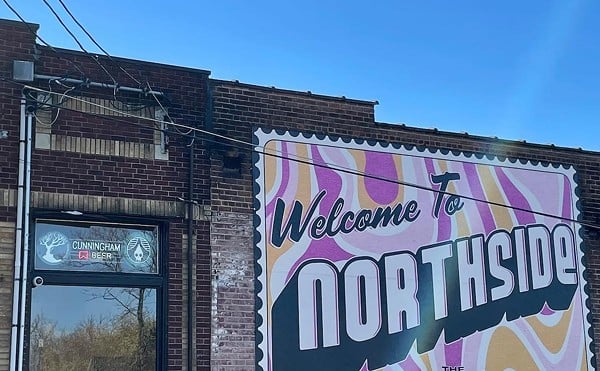|
Since their formation eight years ago, there's been very little about The National that could be characterized as standard issue. The quintet of Cincinnatians (vocalist Matt Berninger, guitarist Bryce Dessner, twin brother and bassist Aaron Dessner, guitarist Scott Devendorf and brother/drummer Bryan Devendorf) were only marginally interconnected when they independently moved to New York and formed The National in 1999, immediately becoming a band informed by their mutual upbringing but greatly influenced by their newly transformed environment.
"Bryan, my brother and I have been in bands since we were like 13," says guitarist Bryce Dessner from his Brooklyn apartment. "I'll be totally embarrassed if anybody digs it up, but our high school band was called Equinox — basically a party band — and the other band was called Project Nim. And Scott and Matt had a band called Nancy when they were at (the University of Cincinnati) that some people in Cincinnati seem to know about. Bryan and Scott were also in a band called the Flaming Intestines, which was a Punk band in the late '80s.
"So there's a whole history of criticisms. If a new song sounds remotely like Project Nim, it's a bad song."
The National's 2001 debut, on the indie Brassland label, offered a hybrid of Electronic/New Wave energy and rootsy Americana sensibility, with Berninger's rolling baritone approximating a sing-off between Leonard Cohen and Ian Curtis, as the band exuded their best Grandaddy-channeling-American-Music-Club-for-a-Smiths-tribute vibe.
With each successive release — 2002's Sad Songs for Dirty Lovers, 2004's Cherry Tree EP and 2005's Alligator — The National incrementally toned down the Roots elements and focused on Berninger's urbanely oblique lyrics of sorrow, regret and longing, his hypnotically sonorous delivery and the band's more interesting Smiths/Bad Seeds influences.
Alligator became The National's most well-received album to date and set the stage for an intense and lengthy period of touring.
"We toured forever, and a lot of it was great but some of it we shouldn't have done," Dessner says with a wry laugh. "There was this infamous tour of Italy in the summer right after (Alligator) came out where we were playing on the beach to 50 people. It was exhausting."
After some much needed down time — which for Dessner includes playing in Clogs, his Chamber Rock side project, and acting as touring guitarist for Sufjan Stevens — the quintet finally reconvened to begin work on their fourth full-length album, Boxer. Although the band had a clear idea of what they wanted to do on Boxer, the fact that all five members have a hand in the writing process complicated matters.
"It's a real democratic band and we all contribute equally to it, which is amazing when it happens," Dessner says. "It's a rare thing to find with collaborators but it's also really difficult. There were some really hard times in recording this new album, like where we had really different ideas about it. We all just cared so much about the outcome, not necessarily the reception but the actual music, and it's this intense kind of energy and if you get too close to it or too wrapped up in it, it can hurt you."
Although the positive press for Alligator was flattering, Dessner insists that none of that was on the band's collective mind when the time came to create Boxer.
"Even though it was acclaimed, it was a gradual build, and we left off in a really nice place where we had an audience," Dessner says. "Pretty much everywhere we would go in the last days of touring Alligator, it'd be sold out, or in England we were playing bigger rooms. But it's not like we were Arcade Fire, where it totally exploded. We don't have an inflated sense of ourselves. We don't think we're God's gift to Rock & Roll."
With the knowledge that they'd accrued a patient fan base that was willing to allow an album to slowly blossom, The National pushed their arrangements slightly, expanding some (with horns and strings courtesy of brilliant Clogs multi-instrumentalist Padma Newsome and occasional piano from Sufjan Stevens), simplifying others and giving drummer Bryan Devendorf a prowling percussive range within every song. As a result, Boxer rings with a dark, after-midnight energy, coated with Berninger's honeyed, pine-tar vocals and spiced with his profoundly obtuse wordplay, none of which was particularly premeditated.
"Alligator didn't top any charts and it was obvious we were still in the shadows, so going into this one, the only thing we wanted to do was try not to make another version of Alligator," says frontman/lyricist Berninger. "We never really have a plan going into making a new record. We see what kind of songs start sticking with us and we'll follow them."
From the start, one of the big differences for The National on the Boxer material was in the physical structure of their songwriting. The Dessner brothers were composing in an altered fashion on guitar, and then they utilized piano to begin the actual writing process, which ultimately gave the songs an interesting twist when they were reconfigured back into guitar songs.
"Aaron was writing a lot of stuff in a different mood than before," Berninger says. "The initial sketches were these repetitive, rhythmic guitar melody sketches, and there weren't big complicated shifts and changes. They were beautiful, and from the very beginning the personality of this one was going to be different.
"The stuff that I started writing to it started to take on some different colors from Alligator, which had a frantic intensity and some of this was more surreal and dreamy. And with the things that Padma was doing, and what Bryan was doing drumming-wise, I think there were more subtle textures than we've ever done in the past."
Although Berninger's lyrics were largely inspired by the music that the band provided him, he approached Boxer with at least one partially thought-out goal in mind.
"Usually our goal is that we want to make a record that we can keep listening to and love it for a long time, especially knowing that we're going to have to go out and perform these songs for a long time," he says. "So the goal was to try things that we hadn't done — and it's not like we reinvented ourselves or anything — and make something exciting and refreshing for us. It boils down to, if it's something we can listen to 20 times in a row and still like it, we know we've got something that we'll be proud to put on the record."
The National clearly didn't over-think the process going into Boxer, but at the same time, the band understands the power and wisdom of at least a modicum of forethought.
"We basically just do what we do and try not to think about it, because the public is so fickle and the press is so fickle, you can't gauge anything based on that," says Dessner. "The one obvious thing is that certain songs became quasi-hits. For instance, 'Mr. November' became kind of a live hit, so do we try and rewrite 'Mr. November?'
"I think a lot of bands work on formulas like that but it just never works for us. Like when Matt started screaming, it wasn't a conscious decision, it just happened live. I think we'd like to preserve that exploration in our music and keep moving forward. Any band that's had some success with a record, the follow-up has a certain amount of pressure. You don't want people to be disappointed. And it's show biz — you've got to live in the light like the sun for a little while. Of course, you don't want to go back to the dark."
In a lot of ways, there is the recognition among The National's members that everything they've done to this point has been building toward Boxer. At the same time, they realize that they've always been more interested in the journey than the destination, and are simply enjoying the accomplishment of Boxer and the satisfaction of their careers at this juncture before heading out on what is sure to be another extensive and successful road trip.
"Nobody expected that we could make a living being in a band, so as that's become more of a reality, like a dream we had come true," Dessner says. "To a certain extent, some of the lyrics are playing with that idea on the record, the dream life we've been living and the good and bad things about it.
"There's a certain level of confidence about it that I feel in the songwriting. I don't want to use the word 'mature,' but maybe it's more mature in a way. It just feels like we're operating within our own realm and have created our own little niche where we can run."
THE NATIONAL performs Friday at the 20th Century Theater.





